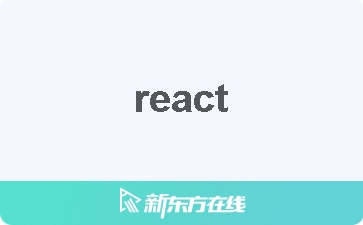react
[VERB]

reacts , reacting , reacted
1. [I 不及物动词] 作出反应
When you react to something that has happened to you, you behave in a particular way because of it.
近义词
双语例句
例:They reacted violently to the news.
他们对这条新闻反应强烈。
例:It's natural to react with disbelief if your child is accused of bullying.
如果你的孩子被指责欺负了人,你不相信是正常的。
2. [I 不及物动词] 反抗
If you react against someone's way of behaving, you deliberately behave in a different way because you do not like the way they behave.
近义词
双语例句
例:My father never saved money and perhaps I reacted against that.
我父亲从不攒钱,也许我正好相反。
3. [I 不及物动词] (对药物或其他所碰触的东西等)起不良反应
If you react to a substance such as a drug, or to something you have touched, you are affected unpleasantly or made ill by it.
双语例句
例:Someone allergic to milk is likely to react to cheese.
对牛奶过敏的人可能对奶酪也有不良反应。
4. [RECIP 相互动词] 起化学反应
When one chemical substance reacts with another, or when two chemical substances react, they combine chemically to form another substance.
双语例句
例:Calcium reacts with water but less violently than sodium and potassium do.
钙能与水产生化学反应,但不如钠和钾之间的反应那么剧烈。
例:Under normal circumstances, these two gases react readily to produce carbon dioxide and water.
在正常情况下,这两种气体迅速发生化学反应,制造出二氧化碳和水。
VERB. 动词

关注新东方在线考雅课程中心
免费获取雅思备考资料包
雅思口语题库
扫码添加助教回复【口语题库】免费领取


 资料下载
资料下载
 公开课
公开课 编辑推荐
编辑推荐